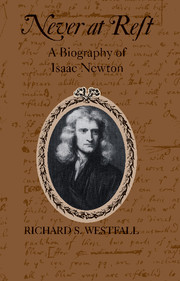Book contents
- Frontmatter
- Contents
- Preface to the paperback edition
- Preface
- Acknowledgments
- A note about dates
- Abbreviations used in footnotes
- 1 The discovery of a new world
- 2 A sober, silent, thinking lad
- 3 The solitary scholar
- 4 Resolving problems by motion
- 5 Anni mirabiles
- 6 Lucasian professor
- 7 Publication and crisis
- 8 Rebellion
- 9 Years of silence
- 10 Principia
- 11 Revolution
- 12 The Mint
- 13 President of the Royal Society
- 14 The priority dispute
- 15 Years of decline
- Bibliographical essay
- List of illustrations
- Index
- General index
- Frontmatter
- Contents
- Preface to the paperback edition
- Preface
- Acknowledgments
- A note about dates
- Abbreviations used in footnotes
- 1 The discovery of a new world
- 2 A sober, silent, thinking lad
- 3 The solitary scholar
- 4 Resolving problems by motion
- 5 Anni mirabiles
- 6 Lucasian professor
- 7 Publication and crisis
- 8 Rebellion
- 9 Years of silence
- 10 Principia
- 11 Revolution
- 12 The Mint
- 13 President of the Royal Society
- 14 The priority dispute
- 15 Years of decline
- Bibliographical essay
- List of illustrations
- Index
- General index
Summary
LOOKING back from the beginning of 1666, one finds it difficult to believe that Newton touched anything but mathematics during the preceding eighteen months. Clearly mathematics did dominate his attention during the period, but it did not completely obliterate other interests. Sometime during this period he also found time to compose the “Quaestiones,” in which he digested current natural philosophy as efficiently as he did mathematics. Other natural philosophers were as ignorant of his existence as mathematicians were. To those who knew of him, his fellow students in Trinity, he was an enigma. The first blossoms of his genius flowered in private, observed silently by his own eyes alone in the years 1664 to 1666, his anni mirabiles.
In addition to mathematics and natural philosophy, the university also made certain demands on his time and attention. He was scheduled to commence Bachelor of Arts in 1665, and regulations demanded that he devote the Lent term to the practice of standing in quadragesima. Pictured in our imagination, the scene has a surrealistic quality, medieval disputations juxtaposed with the birth pains of the calculus. An investigation of curvature was dated 20 February 1665, in the middle of the quadragesimal exercises, and in his various accounts of his mathematical development he assigned the binomial expansion to the winter between 1664 and 1665. While Stukeley was a student in Cambridge over thirty years later, he heard that when Newton stood for his B.A. degree, “he was put to second posing, or lost his groats as they term it, which is look'd upon as disgraceful.”
- Type
- Chapter
- Information
- Never at RestA Biography of Isaac Newton, pp. 140 - 175Publisher: Cambridge University PressPrint publication year: 1981



